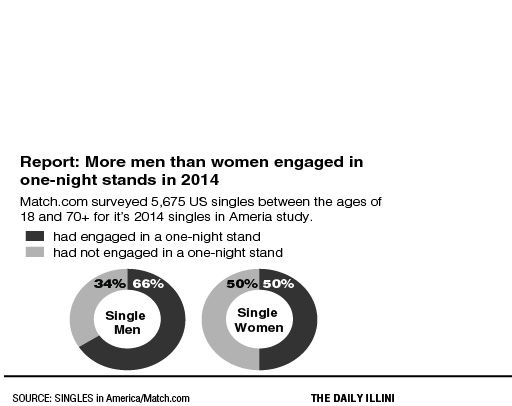More men than women report one-night stands in 2014, study says

Mar 19, 2015
Last updated on Nov. 28, 2016 at 09:08 p.m.
More men than women had one-night stands in 2014.
At least that’s what a study by Match.com found.
Helen Fisher, biological anthropologist and chief scientific advisor to Match.com’s “Singles in America 2014” discovered that 66 percent of single men and 50 percent of single women reported they had engaged in a one-night stand last year.
For the fifth year in a row, the study was produced by Match.com and conducted by Research Now, an online market research company. According to Match.com’s website, the study surveyed 5,675 U.S. singles between the ages of 18 and 70+.
Get The Daily Illini in your inbox!
Pat Morey, assistant dean of students and director of the Women’s Resource Center, said she talked to many students who have felt a little confused by one-night stands, primarily because they didn’t know what was going to happen after.
Those students who were confused sometimes thought they were creating a relationship, rather than doing something one night only, Morey said.
She believes the hook-up culture on campus is often mixed with alcohol consumption, which loosens inhibitions.
It’s important that students think about their values and what they want out of a relationship before the opportunity arises, Morey said.
“I think it can get confusing, and there can be a lot of pressure to kind of conform to something that maybe, it’s not part of your values,” she said.
Chris Wollmuth, junior in LAS, believes there are certain cultural conventions society places on men and women: Men often get bragging rights for sex, though it’s not always viewed the same for women.
When he came to college, Wollmuth was in a committed relationship and had never had a one-night stand. However, when the relationship ended, he said he had the experience, although it did not become prevalent.
Most of his sexual experiences have been in a committed relationship, which he prefers because oftentimes people are expected to put on their best performance for a one-night stand. However, in a committed relationship there is time to grow comfortable with your partner and know each other more intimately.
“The longer you date someone, the better sex is,” Wollmuth said.
Although there is a feeling of immediacy and feeling good, Wollmuth said it is important to be safe about actions regarding sex. He said there is a confusing line when it comes to relationships and casual sex.
“In a relationship, it’s my place to ask that person, ‘Are you clean, have you been tested?’” he said.
However, in a one-night stand, Wollmuth said he is torn because he questions whether it is his place to ask these questions, since he may not see the person again.
Dr. Robert Palinkas, director of McKinley Health Center, said the safest kind of sexual activity involves use of barrier protection when both parties are not intoxicated.
Regardless of what kind of sexual activity, he said there is always the possibility of sexually transmitted infection or pregnancy, if the partners are heterosexual. Issues of anxiety could also arise from the relationship, he said.
He said he would be cautious about focusing on any one study for information because often an individual population is surveyed that might not reflect all people.





